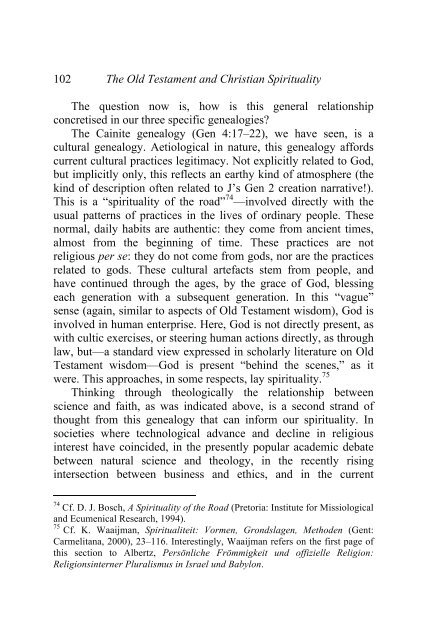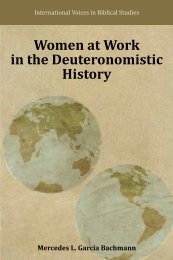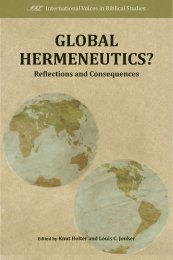The Old Testament and Christian Spirituality - International Voices in ...
The Old Testament and Christian Spirituality - International Voices in ...
The Old Testament and Christian Spirituality - International Voices in ...
Create successful ePaper yourself
Turn your PDF publications into a flip-book with our unique Google optimized e-Paper software.
102 <strong>The</strong> <strong>Old</strong> <strong>Testament</strong> <strong>and</strong> <strong>Christian</strong> <strong>Spirituality</strong><br />
<strong>The</strong> question now is, how is this general relationship<br />
concretised <strong>in</strong> our three specific genealogies?<br />
<strong>The</strong> Ca<strong>in</strong>ite genealogy (Gen 4:17–22), we have seen, is a<br />
cultural genealogy. Aetiological <strong>in</strong> nature, this genealogy affords<br />
current cultural practices legitimacy. Not explicitly related to God,<br />
but implicitly only, this reflects an earthy k<strong>in</strong>d of atmosphere (the<br />
k<strong>in</strong>d of description often related to J’s Gen 2 creation narrative!).<br />
This is a “spirituality of the road” 74 —<strong>in</strong>volved directly with the<br />
usual patterns of practices <strong>in</strong> the lives of ord<strong>in</strong>ary people. <strong>The</strong>se<br />
normal, daily habits are authentic: they come from ancient times,<br />
almost from the beg<strong>in</strong>n<strong>in</strong>g of time. <strong>The</strong>se practices are not<br />
religious per se: they do not come from gods, nor are the practices<br />
related to gods. <strong>The</strong>se cultural artefacts stem from people, <strong>and</strong><br />
have cont<strong>in</strong>ued through the ages, by the grace of God, bless<strong>in</strong>g<br />
each generation with a subsequent generation. In this “vague”<br />
sense (aga<strong>in</strong>, similar to aspects of <strong>Old</strong> <strong>Testament</strong> wisdom), God is<br />
<strong>in</strong>volved <strong>in</strong> human enterprise. Here, God is not directly present, as<br />
with cultic exercises, or steer<strong>in</strong>g human actions directly, as through<br />
law, but—a st<strong>and</strong>ard view expressed <strong>in</strong> scholarly literature on <strong>Old</strong><br />
<strong>Testament</strong> wisdom—God is present “beh<strong>in</strong>d the scenes,” as it<br />
were. This approaches, <strong>in</strong> some respects, lay spirituality. 75<br />
Th<strong>in</strong>k<strong>in</strong>g through theologically the relationship between<br />
science <strong>and</strong> faith, as was <strong>in</strong>dicated above, is a second str<strong>and</strong> of<br />
thought from this genealogy that can <strong>in</strong>form our spirituality. In<br />
societies where technological advance <strong>and</strong> decl<strong>in</strong>e <strong>in</strong> religious<br />
<strong>in</strong>terest have co<strong>in</strong>cided, <strong>in</strong> the presently popular academic debate<br />
between natural science <strong>and</strong> theology, <strong>in</strong> the recently ris<strong>in</strong>g<br />
<strong>in</strong>tersection between bus<strong>in</strong>ess <strong>and</strong> ethics, <strong>and</strong> <strong>in</strong> the current<br />
74<br />
Cf. D. J. Bosch, A <strong>Spirituality</strong> of the Road (Pretoria: Institute for Missiological<br />
<strong>and</strong> Ecumenical Research, 1994).<br />
75<br />
Cf. K. Waaijman, Spiritualiteit: Vormen, Grondslagen, Methoden (Gent:<br />
Carmelitana, 2000), 23–116. Interest<strong>in</strong>gly, Waaijman refers on the first page of<br />
this section to Albertz, Persönliche Frömmigkeit und offizielle Religion:<br />
Religions<strong>in</strong>terner Pluralismus <strong>in</strong> Israel und Babylon.




